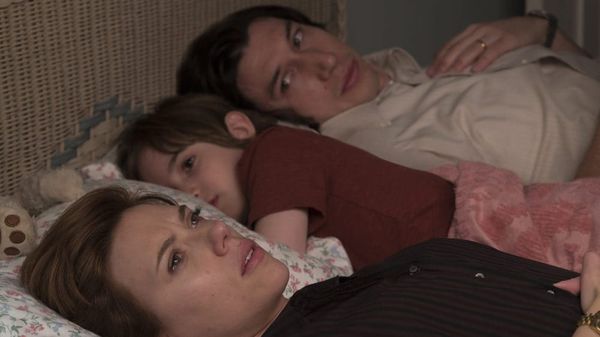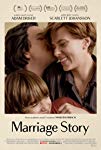Eye For Film >> Movies >> Marriage Story (2019) Film Review
Marriage Story
Reviewed by: Amber Wilkinson

We join this Marriage Story with what sounds like two fairy tale descriptions of a relationship - the Once Upon A Time moments of laughter and quirkiness that drew husband Charlie (Adam Driver) and Nicole (Scarlett Johansson) together which, accompanied as they are, by a deftly edited montage and the sort of jolly music Randy Newman is best known for could lull you into thinking this is a romantic comedy. In fact, we're entering the story of this moderately successful theatre director and his star actress and wife at the point where Happy Ever After is crumbling to such a degree that these letters of positive personality traits each has written as part of a planned therapy session, will not be read out.
Divorce is a perennial cinematic favourite and this time it's writer/director Noah Baumbach who steps into the fray, drawing on past successful examples of type, including the likes of Scenes From A Marriage, the tenor of Woody Allen and Kramer Vs Kramer - adding, like Robert Benton's tearjerker, a young child's custody to complicate the mix.

It's worth noting that Baumbach is on the record stating: "It's not about my marriage in any way." But you can't help feeling that he must at least have drawn on the emotions he experienced when he (a director) went through divorce with actress Jennifer Jason Leigh when their son was still young. There's also a suspicion that, despite its well-balanced beginning, the weight of story and sympathy that drift towards Charlie by the end of the film may also stem from this.
These characters are, to a degree, archetypes - and firmly middle class arty ones at that. Nicole is a bit schlubby but wonderful with kids, while Charlie is the more precise 'homemaker' of the two, even if he seems as fixated on work as he is on family, desperate to give his wife notes on her performance even though the run, as well as their relationship, is finished. They are coupled with two archetypal parts of the US. He, as much wedded to the cold and cramped but what he no doubt perceives as "real" vibe of Brooklyn, she hankering for the physical "space" of sunnyside up California to match the space she also wants to gain in her relationship.
As Nicole moves back to her mother's house on the West Coast - and contends with her family's reluctance to admit her relationship is over - Baumbach turns his attention to the divorce machine that will end up seeing Nicole and Charlie cast in roles they don't expect. Suddenly, their planned amicable settlement takes on a life of its own, as sharp lawyer Nora Fanshaw (Laura Dern) prepares to go for the jugular, while Charlie finds himself being coaxed out of denial by the softer, but rambling brief Bert Spitz (Alan Alda). These supporting players - and others including Ray Liotta - bring with them satire and some of the film's best moments, such as when Nora switches in a heartbeat from hard-nosed negotiation to organising lunch, or Charlie finds himself wondering whether he will be billed for Bert's latest joke.
The film is at its best when it is portraying conflicted emotions - as old love underlies fresh acrimony. When things amp up to actual rows, it takes on a performative element - in mitigation, possibly because the two leads are playing performers - that feels stagy and arch. The indicators of conflict and reconciliation are more comfortable and convincing when Baumbach roots them in more everyday activities, like the opening of a gate or the arrangements of plants in a house. He also wisely chooses the unusual 'holiday' of Halloween to explore what this sort of tug-of-love means for a child.
But you feel the over-enthusiastic push of Baumbach in scenes, such as the serving of divorce papers, where he wants the comedy to rise to the fore so badly he shoves it too hard or when, in the film's latter stages he leans into two songs from Stephen Sondheim's Company as a shortcut to generate emotion, which he just about gets away with in the case of Charlie but which feels like cheating with Nicole. Johansson - reminiscent of a young Tyne Daly - comes out on top in terms of the lead performances, with Driver rather flat by comparison, although the Sondheim at least proves he has a good set of pipes. As this generation's addition to the divorce film genre, it feels more married to films that have gone before than to fresh ideas.
Reviewed on: 16 Dec 2019
















